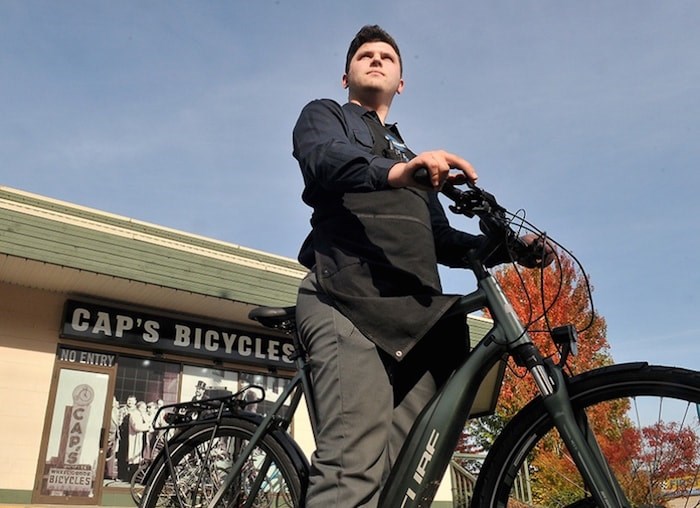Chain lube runs through Joey Hobbis’s veins.
But the 21-year-old grandson of Cap Hobbis, who started the family’s bike business in 1932 with a shop in New Westminster, feels no shame in throwing his leg over an electric-assist bicycle to ride to his job at his dad’s bike shop in Port Moody.
In fact, getting a little pedalling help from the lithium-ion battery-powered integrated drive unit has kept Hobbis on two wheels and allows him to tackle the many hills between work and his home in New West in relative comfort despite nagging injuries to his back and knees from old mountain biking accidents.
 Joey Hobbis comes from a family that has been in the bike business since 1932, but he has no shame using an electric-assist bike to commute from New Westminster to his job at Cap’s Bicycles in Port Moody. Photograph By MARIO BARTEL/THE TRI-CITY NEWS
Joey Hobbis comes from a family that has been in the bike business since 1932, but he has no shame using an electric-assist bike to commute from New Westminster to his job at Cap’s Bicycles in Port Moody. Photograph By MARIO BARTEL/THE TRI-CITY NEWS
“It’s still a bicycle,” Hobbis said. “I feel like any other cyclist.”
According to cycling market analysts Persistence, the global market for electric-assist bicycles is expected to grow 63% by 2025. And Cycling Industry News says some European bike manufacturers are predicting e-bikes will soon comprise 50% of all their production.
Hobbis' dad, Gord Hobbis, who runs the Cap’s shop in Port Moody as well as its New Westminster location, said he’s already seeing that shift at the retail level.
“There’s a lot more acceptance,” Gord Hobbis said.
Motorized bikes were once the domain of tinkerers and inventors who would find ways to add motors to conventional bikes. But improved technology, such as long-range rechargeable batteries and lightweight drive units that integrate readily into modern bike frames, is bringing electric-assist bikes into the mainstream, he said.
“As we see one market, like road bikes, taper off, e-bikes are going up,” Gord Hobbis said, adding that almost every major bike manufacturer now offers a range of electric-assist bikes in its lineup.
That’s creating unique challenges for people like Dragana Mitic, the city of Coquitlam’s transportation planner, whose job includes figuring out where to put designated bike routes and how those fit into the regional network of bikeways.
Mitic said as the ease and relative affordability of electric-assist bikes brings more people to cycling, she has to take into consideration their variability of speed compared to conventional bikes and how to keep everyone who uses the city’s more than 60 km of bike routes feeling safe.
“There’s definitely room for e-bikes,” said Mitic, who came to Coquitlam three months ago from her former position in North Vancouver.
Gord Hobbis said many of his shop’s customers looking for an electric-assist bike are replacing a car for commuting to work or looking to extend the range they’re able to achieve for recreational riding.
“For the cost of car insurance for a year, you can buy an e-bike to get to work,” Hobbis said, adding a mid-level e-bike runs about $2,000.
While some people may balk at spending that much for a conventional bicycle, he said the sticker shock is a little less jolting when an electric engine is involved.
“If it’s a vehicle replacement, it’s an easy justification,” he said.
More bike commuters — whether on conventional or e-bikes — doesn’t just put pressure on cycling routes, Mitic said. Planners also have to look at issues like bike security to encourage multi-modal transportation in which a bike might be one component of a trip that also includes transit.
TransLink will be adding secure bike parkades at three SkyTrain stations in the Tri-Cities — Lafarge Lake, Moody Centre and Burquitlam — next year, in addition to existing bike lockers.
Joey Hobbis said once he got over the initial novelty of not having to pedal at all — which quickly drained his battery — he learned how to manage the electric assistance of his Cube touring bike to smooth out the many hills on his route while still getting a bit of a workout that doesn’t work up a sweat.
“The pedalling is so smooth,” Hobbis said. “It just allows you to jump on and go.”



